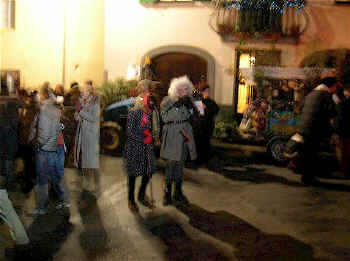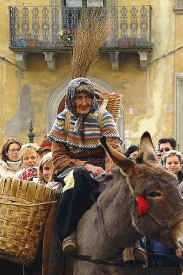|
The
Befanate are alms songs that are sung the day before
Epiphany. They are often called Befane, reflecting both the ceremony’s
protagonist (la befana), as well as the festival itself (Befana -
Epiphany).
These songs were a very widespread part of popular tradition throughout Italy,
in a variety of forms, for requesting alms connected to the annual harvest cycle.
The abundance of the donations offered
was thought to ensure a good harvest in the coming year. The Tuscan Befanate,
corresponding to the Pasquella of Romagna and the Marches, were thus propitiatory rituals for the start of the new seasonal cycle.
In the Province of Lucca,
the tradition of befanate is still alive and well today, and it is easy to find groups of singers both in the
villages, as well as immediately outside the city, such the in S. Anna quarter
of Lucca, on the evening of 6 January.

In the smaller villages, a single group is usually organised, including both children and adults,
while in the towns there can be more than one group, sometimes divided on the basis of age, or by
where they live, or just because they are friends. When there are a number of groups, the youngest initiate the evening
a little after sunset, while for the others the celebrations last almost until sunrise.
In the early evening the group of Befani, as the singers are usually called,
departs to sing at each house, starting from the most distant country houses and
moving towards the priest’s house and that of the Mayor. At least one player has a musical instrument with him, today ever more frequently
an accordion or a guitar, but in the past a violin, and more rarely a barrel
organ. The latter accompanies the songs at Cŕlomini (Molazzana) to this day. Sometimes the full village
band participates, as at Fabbriche di Vŕllico. Sometimes it is only the brass
section, as at Vagli Sopra.
Led by the musician who walks a few steps ahead of her, the Befana (often a man dressed as a woman), sometimes alone,
sometimes accompanied by her consort, the Befanotto, approaches the doors accompanied by the singers.
The songs in the lucca area always quatranes of octonary verses, and can be about a general topic, contain references to contemporary political or social situations or be composed ad personam
- in all cases with a greater or lesser satirical element. In the latter case, each person’s “sins” are disclosed to the
community.
The procession requests permission to perform the song and, at the end, the householder opens the door and offers the
specially-prepared donations. These are collected in a chest carried by two men or in a basket on the back of a donkey.
The song is then resumed, thanking the householder for his gifts.
In the absence of a gift, instead of thanks, the song takes the form of a curse.
Since this is a ritual rooted in the peasant world, the curses aim to strike the
householder’s closest concerns, such as his poultry. One of the most widely
used songs in the Lucca area runs as follows:
E se nulla non ci date
pregherem per la galline
dalle volpi e le faine
che vi sian tutte mangiate.
If you give us nothing
we will pray that your hens
by the foxes and the beech-martens
will all be eaten
If the
dwelling housed a young or not-so-young
unmarried woman, the invective focuses on her:
E se nulla non ci date
via piangendo ce ne andremo
la Madonna pregheremo
che marito non troviate.
If you give us nothing
crying we will go away
we will pray to the Holy Mother
that a husband you will not find

Back to Festivals
of Tuscany
Festivals of Tuscany © ammonet
InfoTech 2007 - 2026. All rights reserved.
|

